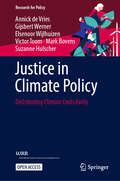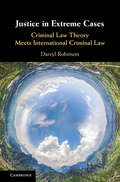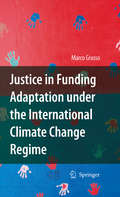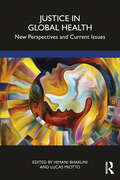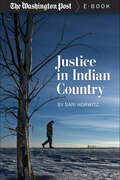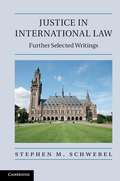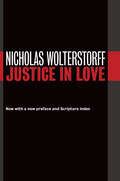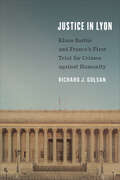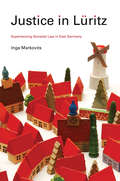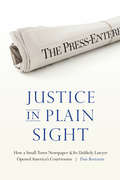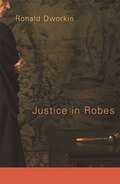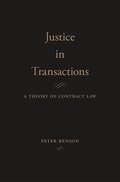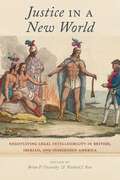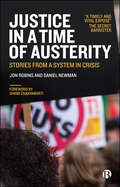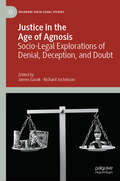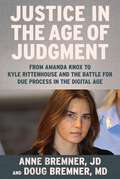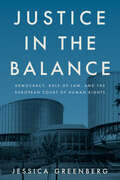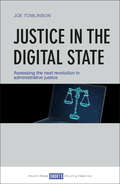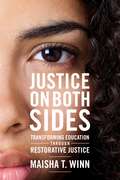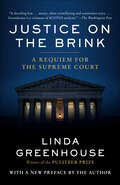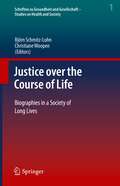- Table View
- List View
Justice in America: The Separate Realities of Blacks and Whites
by Mark Peffley Jon HurwitzAs reactions to the O. J. Simpson verdict, the Rodney King beating, and the Amadou Diallo killing make clear, whites and African Americans in the United States inhabit two different perceptual worlds, with the former seeing the justice system as largely fair and color blind and the latter believing it to be replete with bias and discrimination. The authors tackle two important questions in this book: what explains the widely differing perceptions, and why do such differences matter? They attribute much of the racial chasm to the relatively common personal confrontations that many blacks have with law enforcement - confrontations seldom experienced by whites. More importantly, the authors demonstrate that this racial chasm is consequential: it leads African Americans to react much more cynically to incidents of police brutality and racial profiling, and also to be far more skeptical of punitive anti-crime policies ranging from the death penalty to three-strikes laws.
Justice in Asia and the Pacific Region, 1945-1952
by Yuma TotaniThis book explores a cross section of war crimes trials that the Allied powers held against the Japanese in the aftermath of World War II. More than 2,240 trials against some 5,700 suspected war criminals were carried out at 51 separate locations across the Asia Pacific region. This book analyzes fourteen high-profile American, Australian, British, and Philippine trials, including the two subsequent proceedings at Tokyo and the Yamashita trial. By delving into a large body of hitherto underutilized oral and documentary history of the war as contained in the trial records, Yuma Totani illuminates diverse firsthand accounts of the war that were offered by former Japanese and Allied combatants, prisoners of war, and the civilian population. Furthermore, the author makes a systematic inquiry into select trials to shed light on a highly complex - and at times contradictory - legal and jurisprudential legacy of Allied war crimes prosecutions.
Justice in Climate Policy: Distributing Climate Costs Fairly (Research for Policy)
by Mark Bovens Victor Toom Annick de Vries Gijsbert Werner Elsenoor Wijlhuizen Suzanne HulscherThis open access book is looking into ways to achieve just climate policy within a country. The authors of this monograph share a unique, timely and original vision: continuous support for climate policy is more likely to emerge when citizens find that the distribution of the bill for climate costs is fair. But what is a fair distribution of climate costs? This is an important question because financial costs of mitigation (reducing greenhouse gases), adaptation (adapting to climate change) and damage (compensating or compensating after weather extremes) increase significantly in the coming decades. Drawing on philosophy and ethics, the authors propose ten principles for achieving just distributions of domestic climate costs. Examples of such principles are individual responsibility, the polluter pays, greatest utility and capacity to pay. Yet what a fair distribution is, depends on, for example, political preferences and the policy issue at hand. Empirical research on designing climate policies, however, shows that distributive principles are not part of the political, policy, and public discussions. The authors therefore argue that explicit attention to principles of just distribution at the start of a policy process contributes to support for climate policy. This book provides tools to professionals and students to achieve justice in climate policy.
Justice in Extreme Cases: Criminal Law Theory Meets International Criminal Law
by Darryl RobinsonIn Justice in Extreme Cases, Darryl Robinson argues that the encounter between criminal law theory and international criminal law (ICL) can be illuminating in two directions: criminal law theory can challenge and improve ICL, and conversely, ICL's novel puzzles can challenge and improve mainstream criminal law theory. Robinson recommends a 'coherentist' method for discussions of principles, justice and justification. Coherentism recognizes that prevailing understandings are fallible, contingent human constructs. This book will be a valuable resource to scholars and jurists in ICL, as well as scholars of criminal law theory and legal philosophy.
Justice in Funding Adaptation under the International Climate Change Regime
by Marco GrassoCovering the ethical dimensions of international-level adaptation funding, a subject of growing interest in the climate change debate, this book provides a theoretical analysis of the ethical foundations of the UNFCCC regime on adaptation funding, one that culminates in the definition of a framework of justice. The text features an interpretative analysis of the ethical contents of the UNFCCC funding architecture by applying the framework of justice proposed to different areas of empirical investigation. The book offers scholars working on climate change, international relations, and environmental politics an analysis characterized by both theoretical soundness and empirical richness. The comprehensiveness of the book's approach should make it possible to plan and implement international adaptation funding more effectively, and eventually to define more just funding policies and practices.
Justice in Global Health: New Perspectives and Current Issues
by Himani Bhakuni Lucas MiottoRather than making another attempt at proposing a single and unifying theory of global health justice, this timely collection brings together, instead, scholars from a range of traditions to frame the issue more broadly, highlighting not only different perspectives but also key topics and debates. The volume features chapters that offer both new theoretical approaches to global health justice, as well as fresh takes on existing frameworks. Others adopt a bottom-up approach to tackle specific problems, including the sexual rights of children and adolescents, artificial intelligence (AI) in medicine, framing of neglected tropical diseases, securitization of health, and trademarks in global health. Brought together within one volume, the breadth of these chapters provides a unique and enlightening contribution to the wider Global Health field. This important volume will be a fascinating read for students and researchers across Global Health, Bioethics, Political Philosophy, and Global Development.
Justice in Indian Country
by Sari Horwitz The Washington PostThis eye-opening report is the product of a year-long investigation into how the legal system in Indian country fails some of America's most vulnerable citizens—and what is being done to begin to rectify an ongoing tragedy.Sari Horwitz, recipient of the ASNE Award for Distinguished Writing on Diversity, traveled to an Indian reservation in Minnesota to interview a Native American woman who had been sexually assaulted, as had her mother and daughter. In each case, the assailants, who were not Native American, were not prosecuted due to loopholes in the laws on jurisdiction of criminal prosecution on Indian reservations. This story set her off on a journey across the country, into remote villages and tribal lands where Horwitz uncovered the widespread failures of the American legal system and its inability to protect Native American women and children.This powerful call-to-action gives a view that is charged and insightful, exploring the deeply human consequences of a bureaucracy that has often done more harm than good. As President Obama's administration sets out to close the loopholes and bring justice to survivors, Horwitz speaks to the people these new laws will impact, describes their hopes for the future and gives voice to those who have been silent for too long.
Justice in International Law
by Stephen M. SchwebelSince 1947, Stephen M. Schwebel has written some 200 articles and book reviews on topics of international law, international arbitration and international relations. This volume brings together thirty-two of the legal articles and commentaries written since the first volume of his essays was published in 1994. The essays analyze contentious issues of international arbitration and international law such as the place of preparatory work in interpreting treaties, the role of a judge of the nationality of a party to a case sitting in judgment in the International Court of Justice, and the meaning of the term 'investment' in ICSID jurisprudence. Together with his unofficial writings, his judicial opinions are catalogued in the list of publications with which this volume concludes.
Justice in Love: Essays On Justice, Art, And Liturgy (Emory University Studies in Law and Religion (EUSLR))
by Nicholas WolterstorffAn eminent Christian philosopher's take on justice, rights, wrongs -- and what love has to do with it allLove and justice have long been prominent themes in the moral culture of the West, yet they are often considered to be almost hopelessly at odds with one another. In this book acclaimed Christian philosopher Nicholas Wolterstorff shows that justice and love are at heart perfectly compatible, and he argues that the commonly perceived tension between them reveals something faulty in our understanding of each. True benevolent love, he says, is always attentive to justice, and love that wreaks injustice can only ever be "malformed love." Wolterstorff's Justice in Love is a welcome companion and follow-up volume to his magnificentJustice: Rights and Wrongs (Princeton, 2010). Building upon his expansive discussion of justice in that earlier work and charitably engaging alternative views, this book focuses in profound new ways on the complex yet ultimately harmonious relation between justice and love.
Justice in Lyon: Klaus Barbie and France’s First Trial for Crimes against Humanity
by Richard J. GolsanThe trial of former SS lieutenant and Gestapo chief Klaus Barbie was France’s first trial for crimes against humanity. Known as the "Butcher of Lyon" during the Nazi occupation of that city from 1942 to 1944, Barbie tortured, deported, and murdered thousands of Jews and Resistance fighters. Following a lengthy investigation and the overcoming of numerous legal and other obstacles, the trial began in 1987 and attracted global attention. Justice in Lyon is the first comprehensive history of the Barbie trial, including the investigation leading up to it, the legal background to the case, and the hurdles the prosecution had to clear in order to bring Barbie to justice. Richard J. Golsan examines the strategies used by the defence, the prosecution, and the lawyers who represented Barbie’s many victims at the trial. The book draws from press coverage, articles, and books about Barbie and the trial published at the time, as well as recently released archival sources and the personal archives of lawyers at the trial. Making the case that, despite the views of its many critics, the Barbie trial was a success in legal, historical, and pedagogical terms, Justice in Lyon details how the trial has had a positive impact on French and international law governing crimes against humanity.
Justice in Lüritz: Experiencing Socialist Law in East Germany
by Inga MarkovitsAs a child, Inga Markovits dreamt of stealing and reading every letter contained in a mailbox at a busy intersection of her town in order to learn what life is all about. When, decades later, working as a legal historian, she tracked down the almost complete archive of a former East German trial court, she knew that she had finally found her mailbox. Combining her work in this extraordinary archive with interviews of former plaintiffs and defendants, judges and prosecutors, government and party functionaries, and Stasi collaborators, all in the little town she calls "Lüritz," Markovits has written a remarkable grassroots history of a legal system that set out with the utopian hopes of a few and ended in the anger and disappointment of the many. This is a story of ordinary men and women who experienced Socialist law firsthand--people who applied and used the law, trusted and resented it, manipulated and broke it, and feared and opposed it, but who all dealt with it in ways that help us understand what it meant to be a citizen in a twentieth-century Socialist state, what "Socialist justice" aimed to do, and how, in the end, it failed. Brimming with human stories of obedience and resistance, endurance and cunning, and cruelty and grief, Justice in Lüritz is ultimately a book about much more than the law, or Socialism, or East Germany.
Justice in Plain Sight: How a Small-Town Newspaper and Its Unlikely Lawyer Opened America's Courtrooms
by Dan BernsteinJustice in Plain Sight is the story of a hometown newspaper in Riverside, California, that set out to do its job: tell readers about shocking crimes in their own backyard. But when judges slammed the courtroom door on the public, including the press, it became impossible to tell the whole story. Pinning its hopes on business lawyer Jim Ward, whom Press-Enterprise editor Tim Hays had come to know and trust, the newspaper took two cases to the U.S. Supreme Court in the 1980s. Hays was convinced that the public—including the press—needed to have these rights and needed to bear witness to justice because healing in the aftermath of a horrible crime could not occur without community catharsis. The newspaper won both cases and established First Amendment rights that significantly broadened public access to the judicial system, including the right for the public to witness jury selection and preliminary hearings.Justice in Plain Sight is a unique story that, for the first time, details two improbable journeys to the Supreme Court in which the stakes were as high as they could possibly be (and still are): the public's trust in its own government.
Justice in Plainclothes: A Theory of American Constitutional Practice
by Lawrence G. SagerSager (law, U. of Texas, Austin) examines constitutional practice in the United States. He treats judges as active partners in the enterprise of securing the fundamentals of political justice and sees the process of constitutional adjudication as a distinctly democratic addition to that enterprise. He also presents a case for the constitutional right to secure a materially decent life and argues that the Constitution's obduracy to amendment is one of its virtues. Annotation ©2004 Book News, Inc. , Portland, OR (booknews. com)
Justice in Robes
by Ronald DworkinHow should a judge’s moral convictions bear on his judgments about what the law is? Lawyers, sociologists, philosophers, politicians, and judges all have answers to that question: these range from “nothing” to “everything.”In Justice in Robes, Ronald Dworkin argues that the question is much more complex than it has often been taken to be and charts a variety of dimensions—semantic, jurisprudential, and doctrinal—in which law and morals are undoubtedly interwoven. He restates and summarizes his own widely discussed account of these connections, which emphasizes the sovereign importance of moral principle in legal and constitutional interpretation, and then reviews and criticizes the most influential rival theories to his own. He argues that pragmatism is empty as a theory of law, that value pluralism misunderstands the nature of moral concepts, that constitutional originalism reflects an impoverished view of the role of a constitution in a democratic society, and that contemporary legal positivism is based on a mistaken semantic theory and an erroneous account of the nature of authority. In the course of that critical study he discusses the work of many of the most influential lawyers and philosophers of the era, including Isaiah Berlin, Richard Posner, Cass Sunstein, Antonin Scalia, and Joseph Raz.Dworkin’s new collection of essays and original chapters is a model of lucid, logical, and impassioned reasoning that will advance the crucially important debate about the roles of justice in law.
Justice in Transactions: A Theory of Contract Law
by Peter BensonLegal thinkers typically justify contract law on the basis of economics or promissory morality. But Peter Benson takes another approach. He argues that contract is best explained as a transfer of rights governed by a conception of justice. The result is a comprehensive theory of contract law congruent with Rawlsian liberalism.
Justice in a New World: Negotiating Legal Intelligibility in British, Iberian, and Indigenous America (Religion and Social Transformation)
by Brian P Owensby Richard J RossA historical and legal examination of the conflict and interplay between settler and indigenous laws in the New WorldAs British and Iberian empires expanded across the New World, differing notions of justice and legality played out against one another as settlers and indigenous people sought to negotiate their relationship. In order for settlers and natives to learn from, maneuver, resist, or accommodate each other, they had to grasp something of each other's legal ideas and conceptions of justice.This ambitious volume advances our understanding of how natives and settlers in both the British and Iberian New World empires struggled to use the other’s ideas of law and justice as a political, strategic, and moral resource. In so doing, indigenous people and settlers alike changed their own practices of law and dialogue about justice. Europeans and natives appealed to imperfect understandings of their interlocutors’ notions of justice and advanced their own conceptions during workaday negotiations, disputes, and assertions of right. Settlers’ and indigenous peoples’ legal presuppositions shaped and sometimes misdirected their attempts to employ each other’s law. Natives and settlers construed and misconstrued each other's legal commitments while learning about them, never quite sure whether they were on solid ground. Chapters explore the problem of “legal intelligibility”: How and to what extent did settler law and its associated notions of justice became intelligible—tactically, technically and morally—to natives, and vice versa? To address this question, the volume offers a critical comparison between English and Iberian New World empires. Chapters probe such topics as treaty negotiations, land sales, and the corporate privileges of indigenous peoples. Ultimately, Justice in a New World offers both a deeper understanding of the transformation of notions of justice and law among settlers and indigenous people, and a dual comparative study of what it means for laws and moral codes to be legally intelligible.
Justice in a Time of Austerity: Stories From a System in Crisis
by Daniel Newman Jon RobinsHow are poverty and social inequality entrenched through a failing justice system? In this important book, Jon Robins and Daniel Newman examine how the lives of people already struggling with problems with their welfare benefits, jobs, housing and immigration are made much harder by cuts to legal aid and the failings of our creaking justice system. Over the course of 12 months, interviews were carried out on the ground in a range of settings with people as they were caught up in the justice system, in a range of settings such as foodbanks in a church hall in a wealthy part of London; a community centre in a former mining town; a homeless shelter for rough sleepers in Birmingham; and a destitution service for asylum seekers in a city on the South coast, as well as in courts and advice agencies up and down the country. The authors argue that a failure to access justice all too often represents a catastrophic step in the life of the person concerned and their family. This powerful, yet moving, account humanises the hostile political debates that surround legal aid and reveals what access to justice really means in Austerity Britain.
Justice in the Age of Agnosis: Socio-Legal Explorations of Denial, Deception, and Doubt (Palgrave Socio-Legal Studies)
by Richard Jochelson James GacekThis book seeks to further the understanding of the human experience of coerced and forced ignorance on social, human rights and criminal justice related topics, drawing together scholars from multiple, disciplinary fronts. It argues that people in our social world are forced or coerced through either implicatory or interpretive denial that is normalized through specific cultural and social mechanisms by which we refer to this as non-knowledge or agnosis. There has also been a lack of scholarship which examines how human victimization and power intersects by and through the systematic orchestration of forced ignorance and doubt upon daily human life. This book's focus is an examination of the ways in which people find themselves in social spaces without empirical clarity and understand that absence as satisfaction, stability, or perhaps even pleasure. It discusses a range of topics, including for example people's sense of relative safety, despite empirical realities suggesting otherwise. This book seeks to make visible the role of ignorance in governing society, highlighting how the late modern human experience in a post-World War II human rights era subsumes, subverts, and sublimates the complex relationship between knowledge and denial; the empirical gulf between knowledge and resistance may indeed breed complicit bliss.
Justice in the Age of Judgment: From Amanda Knox to Kyle Rittenhouse and the Battle for Due Process in the Digital Age
by Anne Bremner Doug Bremner MDFrom Amanda Knox to O.J., Casey Anthony to Kyle Rittenhouse, our justice system faces scrutiny and pressure from the media and public like never before. Can the bedrock of &“innocent until proven guilty&” survive in what acclaimed Seattle attorney and legal analyst Anne Bremner calls the age of judgement? When unscrupulous Italian prosecutors waged an all-out war in the media and courtroom to wrongly convict American exchange student Amanda Knox for a murder she didn&’t commit, family and friends turned to renowned Seattle attorney and media legal analyst Anne Bremner to help win her freedom. The case was dubbed the &“trial of the decade&” and would coincide with the explosion of social media and a new era of trying cases in public as much as the courtroom. While Italian prosecutors, the press, and online lynch mobs convicted Knox in the court of public opinion, Bremner would draw upon her decades in the courtroom and in front of the camera to turn the tide with a new kind of defense in pursuit of justice. In Justice in the Age of Judgement, Anne Bremner and Doug Bremner take us inside some of the biggest cases of recent times and offer their expert, thought-provoking insights and analysis as our legal system faces unprecedented forces fighting to tip the scales of justice their way. Why couldn&’t prosecutors convict O.J. Simpson despite all of the evidence seemingly proving he killed his wife Nicole? Could a jury remain unbiased in the face of overwhelming public pressure in the trial of Minneapolis police officer Derek Chauvin for the murder of George Floyd? Why was Kyle Rittenhouse exonerated after shooting three people (killing two) with an assault rifle at a violent rally despite widespread media reports seemingly proving his guilt, and national calls for his conviction?Justice in the Age of Judgement is an unparalleled and unflinching look at the captivating cases tried on Twitter and TV, where the burden of proof and fundamental legal tenet of &“innocent until proven guilty&” is under assault from the court of public opinion.
Justice in the Balance: Democracy, Rule of Law, and the European Court of Human Rights (Stanford Studies in Human Rights)
by Jessica GreenbergEstablished as a post-World War II response to conflict and fascism, the European Court of Human Rights is routinely characterized as the most successful human rights institution in the world. Based in Strasbourg, France, its jurisdiction extends to over 700 million people on European soil across the 46 Council of Europe member countries. The Court is the crown jewel of the Council, an international organization dedicated to human rights, democracy, and the rule of law. And yet, for years, European institutions have been haunted by the specter of failure. In the shadow of rising populism, inequality, and war, faith in democracy and the rule of law has been shaken to its core. Drawing on extensive fieldwork conducted over eight years with human rights advocates, lawyers, and judges at the European Court of Human Rights, this book asks: What kind of justice is possible through law? Drawing on participant observation, in-depth interviews, and archival research, Jessica Greenberg tracks two paradoxical experiences of the European human rights system and the Court: on the one hand, the Court as a bureaucratic "machine;" on the other, the Court as the "conscience of Europe." She argues that human rights frameworks fuel imaginative approaches to social change, and compel legal actors to creatively navigate institutions through advocacy, persuasion, and innovative interpretation of what the law is and what it should be.
Justice in the Digital State: Assessing the Next Revolution in Administrative Justice
by Joe TomlinsonAvailable Open Access under CC-BY-NC licence. Exploring how justice is delivered at a time of rapid technological transformation, Justice in the Digital State exposes urgent issues surrounding the modernisation of courts and tribunals whilst examining the effects of technology on established systems. Case studies investigate the rise of crowdfunded judicial reviews, the digitalisation of tribunals and the rise of ‘agile’ methodologies in building administrative justice systems. Joe Tomlinson’s cutting-edge research offers an authoritative and much-needed guide for navigating through the challenges of digital disruption.
Justice on Both Sides: Transforming Education through Restorative Justice (Race and Education)
by Maisha T. WinnRestorative justice represents “a paradigm shift in the way Americans conceptualize and administer punishment,” says author Maisha T. Winn, from a focus on crime to a focus on harm, including the needs of both those who were harmed and those who caused it. Her book, Justice on Both Sides, provides an urgently needed, comprehensive account of the value of restorative justice and how contemporary schools can implement effective practices to address inequalities associated with race, class, and gender. <p><p> Winn, a restorative justice practitioner and scholar, draws on her extensive experience as a coach to school leaders and teachers to show how indispensable restorative justice is in understanding and addressing the educational needs of students, particularly disadvantaged youth. Justice on Both Sides makes a major contribution by demonstrating how this actually works in schools and how it can be integrated into a range of educational settings. It also emphasizes how language and labeling must be addressed in any fruitful restorative effort. Ultimately, Winn makes the case for restorative justice as a crucial answer, at least in part, to the unequal practices and opportunities in American schools.
Justice on Trial: The Kavanaugh Confirmation and the Future of the Supreme Court
by Mollie Hemingway Carrie SeverinoJustice Anthony Kennedy slipped out of the Supreme Court building on June 27, 2018, and traveled incognito to the White House to inform President Donald Trump that he was retiring, setting in motion a political process that his successor, Brett Kavanaugh, would denounce three months later as a “national disgrace” and a “circus.” <P><P>Justice on Trial, the definitive insider’s account of Kavanaugh’s appointment to the Supreme Court, is based on extraordinary access to more than one hundred key figures—including the president, justices, and senators—in that ferocious political drama. The Trump presidency opened with the appointment of Neil Gorsuch to succeed the late Antonin Scalia on the Supreme Court. <P><P>But the following year, when Trump drew from the same list of candidates for his nomination of Brett Kavanaugh, the justice being replaced was the swing vote on abortion, and all hell broke loose. <P><P> The judicial confirmation process, on the point of breakdown for thirty years, now proved utterly dysfunctional. Unverified accusations of sexual assault became weapons in a ruthless campaign of personal destruction, culminating in the melodramatic hearings in which Kavanaugh’s impassioned defense resuscitated a nomination that seemed beyond saving. <P><P>The Supreme Court has become the arbiter of our nation’s most vexing and divisive disputes. With the stakes of each vacancy incalculably high, the incentive to destroy a nominee is nearly irresistible. <P><P>The next time a nomination promises to change the balance of the Court, Hemingway and Severino warn, the confirmation fight will be even uglier than Kavanaugh’s. A good person might accept that nomination in the naïve belief that what happened to Kavanaugh won’t happen to him because he is a good person. But it can happen, it does happen, and it just happened. The question is whether America will let it happen again. <P><b>A New York Times Bestseller</b>
Justice on the Brink: The Death of Ruth Bader Ginsburg, the Rise of Amy Coney Barrett, and Twelve Months That Transformed the Supreme Court
by Linda Greenhouse&“This landmark new book gives us an invaluable perspective on the Supreme Court in democracy&’s hour of maximum danger.&”—Jon Meacham The gripping story of the year that transformed the Supreme Court into the court of Donald Trump and Amy Coney Barrett, from the Pulitzer Prize–winning law columnist for The New York Times At the end of the Supreme Court&’s 2019–20 term, the center was holding. The predictions that the court would move irrevocably to the far right hadn&’t come to pass, as the justices released surprisingly moderate opinions in cases involving abortion rights, LGBTQ rights, and how local governments could respond to the pandemic, all shepherded by Chief Justice John Roberts. By the end of the 2020–21 term, much about the nation&’s highest court has changed. The right-wing supermajority had completed its first term on the bench, cementing Donald Trump&’s legacy on American jurisprudence.This is the story of that term. From the death of Ruth Bader Ginsburg to the rise of Amy Coney Barrett, from the pandemic to the election, from the Trump campaign&’s legal challenges to the ongoing debate about the role of religion in American life, the Supreme Court has been at the center of many of the biggest events of the year. Throughout Justice on the Brink, legendary journalist Linda Greenhouse, who won a Pulitzer Prize for her Supreme Court coverage, gives us unique insight into a court under stress, providing the context and brilliant analysis readers of her work in The New York Times have come to expect.Ultimately, Greenhouse asks a fundamental question relevant to all Americans: Is this still John Roberts&’s Supreme Court, or does it now belong to Donald Trump?
Justice over the Course of Life: Biographies in a Society of Long Lives (Schriften zu Gesundheit und Gesellschaft - Studies on Health and Society #1)
by Christiane Woopen Björn Schmitz-LuhnIn this interdisciplinary book, experts from philosophy, medicine, law, psychology, economics, and social sciences address questions and develop solutions for a well-designed society of long life. Young as well as old people have to actively shape more and more of their life span. At the same time, aging becomes more multifaceted: the individual view on one’s own life course is changing, and the needs and demands for a fulfilled life are diversifying. The implications affect all spheres of life – from education and workplace to health care and the culture of interaction. They require content-related and structural adjustments for a diverse society of longevity in which multiple generations live alongside each other. But how can change be managed responsibly, how can individual and collective responsibility be distributed appropriately, and how can a sustainable and fair social future be ensured?

